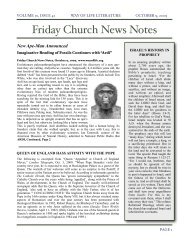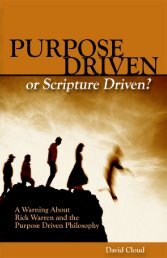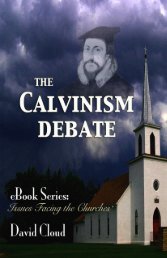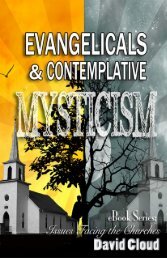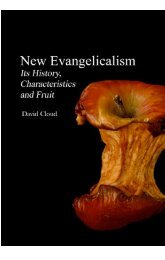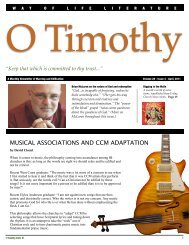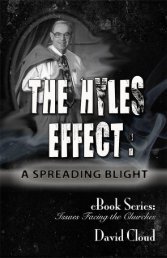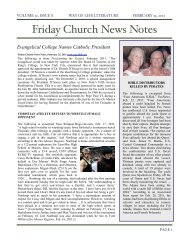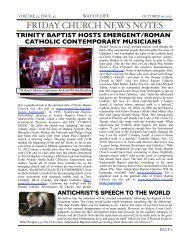- Page 2 and 3:
Directory of Contemporary Worship M
- Page 4 and 5:
Dc Talk ...........................
- Page 6 and 7:
Smith, Chuck ......................
- Page 8 and 9:
god, etc. -- it is obvious that we
- Page 10 and 11:
Directory of Contemporary WorshipMu
- Page 12 and 13:
and live it out/ And live it out/ i
- Page 14 and 15:
on the floor with his feet in the a
- Page 16 and 17:
Arends, CarolynCarolyn Arends (b. 1
- Page 18 and 19:
corrupting her own son’s faith in
- Page 20 and 21:
Balouche relates his testimony of s
- Page 22:
MAYFAIR LAUNDRY, a group which got
- Page 25 and 26:
In his 1965 book, A Spaniard in the
- Page 27 and 28:
Borden, TammyIn July 2012, Tammy Bo
- Page 29 and 30:
Brown is an ecumenist who has worke
- Page 31 and 32:
20 years and who was on the steerin
- Page 33 and 34:
of Baptist churches whose “whole
- Page 35 and 36:
named Lonnie Frisbee, Chuck Smith b
- Page 37 and 38:
me, but they didn’t quickly foist
- Page 39 and 40:
gospel and clear repentance and fai
- Page 41 and 42: Wimber interpreted all of this as t
- Page 43 and 44: Davis of Raze, Eddie Degarmo, Micha
- Page 45 and 46: had a solid testimony of salvation
- Page 47 and 48: ough the decades, Maranatha Music h
- Page 49 and 50: It is painfully obvious that doctri
- Page 52: On another cut entitled “Come int
- Page 55 and 56: me who’s in the house? J.C./ Tell
- Page 57 and 58: is as much a part of the body of Ch
- Page 59 and 60: Chapman, Steven CurtisSteven Curtis
- Page 61 and 62: certain is the revelation we have i
- Page 63 and 64: Waxahachie, Texas). Hatcher was one
- Page 65 and 66: anished one of his followers for tr
- Page 67 and 68: stricken with polio. e boy’s moth
- Page 69 and 70: language you use, or whether or not
- Page 71 and 72: another automobile. Men in the chur
- Page 73 and 74: “e love of God will melt every ha
- Page 75 and 76: to hell “we could contact child p
- Page 77 and 78: composed of three co-equal, co-eter
- Page 79 and 80: If we consider the lyrics to “Hol
- Page 81 and 82: In an interview with CCM Magazine a
- Page 83 and 84: “So hyper fundi, don’t be disma
- Page 85 and 86: Another,” a song with an ecumenic
- Page 87 and 88: Deliriouse rock group Delirious, wh
- Page 89 and 90: is so unclear. It is blind mysticis
- Page 91: in a different way. You have to get
- Page 95 and 96: At first, Dorsey’s illicit mixing
- Page 97 and 98: appearing on Ed Sullivan and other
- Page 99 and 100: the Goodmans. He later joined the B
- Page 101 and 102: world loves nothing better than to
- Page 103 and 104: in less than three years. In June t
- Page 105 and 106: equire repentance, does not judge s
- Page 107 and 108: y any one culture ... He doesn’t
- Page 109 and 110: e party-dude Jesus is a false chris
- Page 111 and 112: e reason that statement doesn’t b
- Page 113 and 114: “I’d love to see the labels fal
- Page 115 and 116: Scriptures do we see anything like
- Page 117 and 118: made the atonement for sin. e love
- Page 119 and 120: “But there I was, in the odd situ
- Page 121 and 122: Moses not sincere when he struck th
- Page 123 and 124: Ephesians 5:11 says, “And have no
- Page 125 and 126: person’s attitude toward correcti
- Page 127 and 128: influence of the “world’s cultu
- Page 129 and 130: ecause “there is no doctrinal iss
- Page 131 and 132: there’s so much pain and hurting/
- Page 133 and 134: you/ We’d come a lot closer to do
- Page 135 and 136: “Finger pointing is never, I thin
- Page 137 and 138: Gaines, Billy and SarahIn 1997, Bil
- Page 139 and 140: e Getty’s popular songs include
- Page 141 and 142: e Getty’s ecumenical, one-world-c
- Page 143 and 144:
ikini-clad teenagers on his lap at
- Page 145 and 146:
In October 2012, the Gettys joined
- Page 147 and 148:
Christian music. In 1985 she said,
- Page 149 and 150:
to marrying another man to whom she
- Page 151 and 152:
“And have no fellowship with the
- Page 153 and 154:
Behind the Eyes was the first of Am
- Page 155 and 156:
that this plight is largely one of
- Page 157 and 158:
“I’m a singer, not a preacher.
- Page 159 and 160:
“Faithless heart/ At times the wo
- Page 161 and 162:
In 2013, Amy gave her first intervi
- Page 163 and 164:
against what I perceived as rules.
- Page 165 and 166:
they become drunken and stagger aro
- Page 167 and 168:
2011. He contributed to the songs
- Page 169 and 170:
(e song “Majesty,” lovely thoug
- Page 171 and 172:
nuns, at the North American Congres
- Page 173 and 174:
MAJOR CONCERN--and everybody knows
- Page 175 and 176:
gospel of ME. She says, “God want
- Page 177 and 178:
in Toronto and Pensacola. e spirit
- Page 179 and 180:
countries is worldly and radically
- Page 181 and 182:
chosen believers will usher in the
- Page 183 and 184:
director of the American Center for
- Page 185 and 186:
Mike Bickle (b. 1944) founded the K
- Page 187 and 188:
in 1983 and prophesied that God was
- Page 189 and 190:
ministry and toured the country. He
- Page 191 and 192:
In 1987 Cain was accepted by Mike B
- Page 193 and 194:
“John would speak and Lonnie woul
- Page 195 and 196:
In 1996 the Vineyard Fellowship dis
- Page 197 and 198:
Billboard Hot 100. It is no wonder
- Page 199 and 200:
Jesus Culture is committed to the l
- Page 201 and 202:
that Pope Paul would have fit in ve
- Page 203 and 204:
of the creation of false churches (
- Page 205 and 206:
Chorus: “Let’s get together, ye
- Page 207 and 208:
objections thrown up by my incredul
- Page 209 and 210:
university professor — there must
- Page 211 and 212:
Surely there is a clear connection
- Page 213 and 214:
e Roman Catholic-style contemplativ
- Page 215 and 216:
“But the album we made for Epic [
- Page 217 and 218:
hymns, he would create an entirely
- Page 219 and 220:
following a universalistic “gospe
- Page 221 and 222:
Jude plainly says some are to be sa
- Page 223 and 224:
Maher ministers at Our Lady of Moun
- Page 225 and 226:
such as Chris Tomlin (“Your Grace
- Page 227 and 228:
people” (Vatican II, Constitution
- Page 229 and 230:
independent Baptist churches are fo
- Page 231 and 232:
Beatles, “More an Words” by Ext
- Page 233 and 234:
ever felt God’s presence in a wor
- Page 235 and 236:
MediaShout, which sells contemporar
- Page 237 and 238:
information about Rich Mullins, mad
- Page 239 and 240:
and salvation (Ephesians 2:8-10; Ro
- Page 241 and 242:
And yet, ALL THESE BIBLE-BELIEVING,
- Page 243 and 244:
which also produces for the Rolling
- Page 245 and 246:
layers of our reality and gets to t
- Page 247 and 248:
every nation and preach the gospel
- Page 249 and 250:
Some of her songs contain a scriptu
- Page 251 and 252:
Canterbury Trail: Why Evangelicals
- Page 253 and 254:
followed by prayers, a prophecy, an
- Page 255 and 256:
Christ stated: “ink not that I am
- Page 257 and 258:
can hear that not all Christian mus
- Page 259 and 260:
claiming to love the Lord. (Many yo
- Page 261 and 262:
When P.O.D. was asked, “Do you tr
- Page 263 and 264:
unity. e name Jehovah is a biblical
- Page 265 and 266:
erase lines. We are to choose the s
- Page 267 and 268:
Beach, California. Gay’s Propheti
- Page 269 and 270:
e false spirit of the latter rain p
- Page 271 and 272:
on before the band said that they w
- Page 273 and 274:
Central training school sponsored b
- Page 275 and 276:
has endorsed e Shack with its non-j
- Page 277 and 278:
Assad converted to the Roman Cathol
- Page 279 and 280:
“e man sitting beside me, Dwayne
- Page 281 and 282:
y the ‘catcher.’ It appeared th
- Page 283 and 284:
laughing hysterically. Some were ro
- Page 285 and 286:
IT BY THE BIBLE. When he finally st
- Page 287 and 288:
Many independent Baptist churches a
- Page 289 and 290:
sorts of false christs, but Warren
- Page 291 and 292:
will with God’s will so that they
- Page 293 and 294:
“God’s wisdom ... goes deep int
- Page 295 and 296:
heard on any Sunday at Saddleback C
- Page 297 and 298:
"ATMOSPHERES ARE GOING TO COME THRO
- Page 299 and 300:
“Everything was fine for the firs
- Page 301 and 302:
and worship in a concert-like setti
- Page 303 and 304:
licentiousness (sex, drugs, etc.) a
- Page 305 and 306:
worship him” (“Mother Teresa To
- Page 307 and 308:
e acronym PEACE gives the means of
- Page 309 and 310:
Warren’s plan also narrows Christ
- Page 311 and 312:
Under Muchow’s direction Saddleba
- Page 313 and 314:
music. ey make no attempt to hide t
- Page 315 and 316:
JARS OF CLAY names Jimi Hendrix and
- Page 317 and 318:
We have seen that contemporary Chri
- Page 319 and 320:
service 2009 and Ozzy Osbourne’s
- Page 321 and 322:
obligations on people. (See “e Sh
- Page 323 and 324:
Magazine, July 1998, pp. 107-108) H
- Page 325 and 326:
“Most people who attended the unu
- Page 327 and 328:
W. Smith’s Rocketown Promote Sata
- Page 329 and 330:
In the same interview, St. James ca
- Page 331 and 332:
want in Christ. Two other of her so
- Page 333 and 334:
I felt ev’ry teardrop when in dar
- Page 335 and 336:
adultery He said, “Neither do I c
- Page 337 and 338:
“He that saith, I know him, and k
- Page 339 and 340:
She moves in charismatic and ecumen
- Page 341 and 342:
warned that in the last days aposta
- Page 343 and 344:
Stryper’s first album, e Yellow a
- Page 345 and 346:
Michael Sweet Please Stand Up,” C
- Page 347 and 348:
clear warnings! 1 Corinthians 6:9 s
- Page 349 and 350:
“[We don’t go to church a lot.]
- Page 351 and 352:
“Van Halen is one of my favorite
- Page 353 and 354:
don’t sing about drugs.’ Strype
- Page 355 and 356:
Stonehill doesn’t seem to like bi
- Page 357 and 358:
Scripture is an idolatrous goddess
- Page 359 and 360:
As for a believer’s old friends t
- Page 361 and 362:
He began meeting with a Catholic pr
- Page 363 and 364:
teach false. Some teach sound doctr
- Page 365 and 366:
the doorstep of a Catholic church c
- Page 367 and 368:
1999, http://www.johnmichaeltalbot.
- Page 369 and 370:
Scripture, and apart from this divi
- Page 371 and 372:
are false christs and false gospels
- Page 373 and 374:
will turn away their ears from the
- Page 375 and 376:
made his Christian commitment. en l
- Page 377 and 378:
and Its Collapse among Fundamental
- Page 379 and 380:
ChristianityToday.com, April 7, 201
- Page 381 and 382:
God has given one faith to His peop
- Page 383 and 384:
human standpoint. Bono, in the 1980
- Page 385 and 386:
things spiritual, superspiritual ch
- Page 387 and 388:
Methodist Church, said, “I don’
- Page 389 and 390:
the love of God, that we keep his c
- Page 391 and 392:
At Wheaton College in 2002, Bono sa
- Page 393 and 394:
Consider the song “All Because of
- Page 395 and 396:
which will be so viciously persecut
- Page 397 and 398:
“Bono dislikes the label ‘born-
- Page 399 and 400:
not even mentioning the name of Chr
- Page 401 and 402:
In 1997, Jaci joined Roman Catholic
- Page 403 and 404:
the Bible’s warnings about the da
- Page 405 and 406:
committed to Scripture alone. e Pro
- Page 407 and 408:
times toppling or altering elements
- Page 409 and 410:
An Unscriptural Emphasis on Miracle
- Page 411 and 412:
In spite of such claims, Wimber’s
- Page 413 and 414:
oldness to start an international m
- Page 415 and 416:
Wimber’s Radical EcumenismJohn Wi
- Page 417 and 418:
men and women whose only crime was
- Page 419 and 420:
Wimber oen recommended the ministri
- Page 421 and 422:
Friesen, quoted by Albert James Dag
- Page 423 and 424:
the manifest presence of Jesus.”
- Page 425 and 426:
Wyse, EricEric Wyse’s “Wonderfu
- Page 427 and 428:
Zschech, Darlene, and HillsongDarle
- Page 429 and 430:
We were taking everyone with us. Bu
- Page 431 and 432:
Mary on the way to the cross, has H
- Page 433 and 434:
To liken a filthy rock singer to th
- Page 435 and 436:
About Way of Life’s eBooksSince J
- Page 437 and 438:
fundamentalist churches through the
- Page 439 and 440:
known facts that illuminate Bible h
- Page 441 and 442:
Antichrist, Gog and Magog, the Batt
- Page 443 and 444:
We deal with Charles Parham, Azusa
- Page 445 and 446:
A N U N S H A K E A B L E FA I T H






